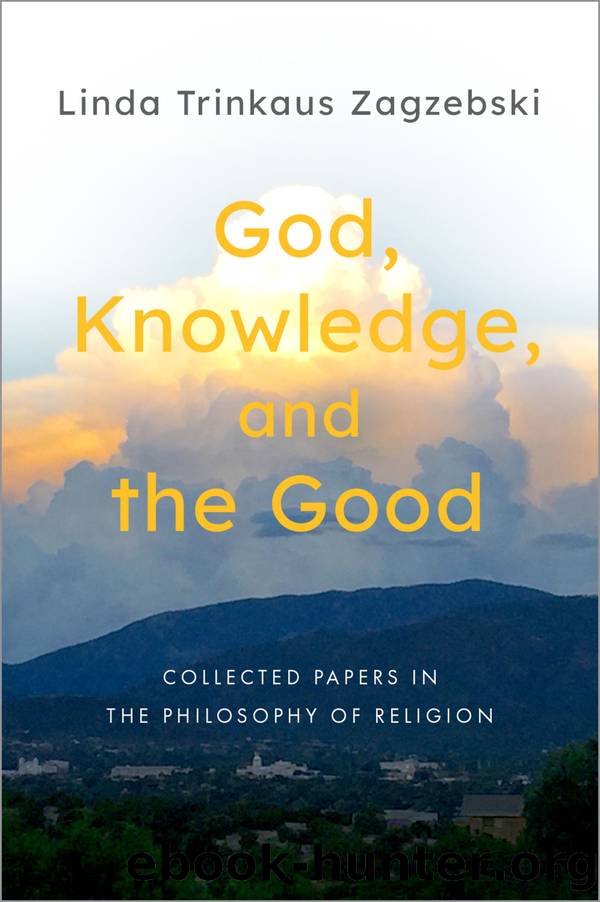God, Knowledge, and the Good by Zagzebski Linda Trinkaus;

Author:Zagzebski, Linda Trinkaus;
Language: eng
Format: epub
Publisher: Oxford University Press, Incorporated
Published: 2022-12-15T00:00:00+00:00
10.3. Exemplarist virtue theory and the imitation of Christ
Ethical theory is concerned with at least three general objects of moral evaluation and the relations among them: acts (right, wrong, duty), persons (virtues and vices), and states of affairs (good and bad).16 Usually one of these categories is taken as basic and the others evaluated in terms of the basic one. For example, some theorists maintain that persons have traits of character like kindness or unkindness because of their propensity to perform acts of a certain description. These theories make the moral properties of acts more basic than the moral properties of persons. Some of them also make the evaluation of acts more basic than that of states of affairs; others do not. So they may define the concepts of a right and wrong act in terms of the goodness and badness of the states of affairs those acts bring about (consequenceâbased), or they may instead treat the concepts of act evaluation as basic (actâbased). Both kinds of theory differ from the type of theory according to which acts have moral properties in virtue of the fact that they are the sort of act that good or bad persons do. This kind of theory makes the moral properties of persons more basic than the moral properties of acts. That is what I mean by a virtue theory. In the most radical form of virtue theory, all moral properties derive from the property of being a good person or having a good personal trait, including the moral properties of states of affairs. There are, of course, many ways to structure a theory of this kind.17
In introducing exemplarism in the last section, I assumed that the moral exemplar is a person, but that is not actually required by the logic of exemplarism. If the only purpose of an exemplar is to break the circle of concepts in a moral theory, that can be done in any number of ways. If the theory is not foundationalist in structure and has no basic concept, then the circle can in principle be broken anywhere. If the theory does have a basic concept, as in the kinds of theory mentioned in the preceding paragraph, then the basic concept is the one that we would want to define by ostensive reference to an exemplar. An actâbased or consequenceâbased theory could in principle use the exemplarist procedure I have described, but if we want the exemplarist approach to give a theoretical basis for the Christian idea of the imitation of Christ, the exemplar should be a person and the resulting theory will be a form of virtue theory.
There is another reason why we would want the exemplar to be a person apart from theological considerations. It is an advantage of a theory if it is practically useful. For that purpose, we need to take into consideration the facts of human behavioral learning. There is significant evidence in developmental psychology that human infants are born to learn through imitation and that the imitation mechanism is innate.
Download
This site does not store any files on its server. We only index and link to content provided by other sites. Please contact the content providers to delete copyright contents if any and email us, we'll remove relevant links or contents immediately.
The European History Highway: A Guide to Internet Resources by Dennis A. Trinkle Scott A. Merriman(497)
The Seven Wonders of the Ancient World by Michael Denis Higgins(479)
European Security without the Soviet Union by Stuart Croft Phil Williams(472)
European Security in a Global Context by Thierry Tardy(471)
The Routledge companion to Christian ethics by D. Stephen Long Rebekah L. Miles(459)
Hudud Al-'Alam 'The Regions of the World' - a Persian Geography 372 A.H. (982 AD) by V. V. Minorsky & C. E. Bosworth(400)
Gorbachev And His Generals by William C. Green(392)
Get Real with Storytime by Julie Dietzel-Glair & Marianne Crandall Follis(390)
Tibetan Studies in Comparative Perspective by Chih-yu Shih Yu-Wen Chen(387)
Governance, Growth and Global Leadership by Espen Moe(384)
Hyperculture by Byung-Chul Han(379)
CliffsNotes on Fitzgerald's The Great Gatsby by Kate Maurer(360)
The Oxford History of the World by Fernández-Armesto Felipe;(354)
How Languages Are Learned 5th Edition by Patsy M Lightbown;Nina Spada; & Nina Spada(353)
The Egyptian Economy, 1952-2000 by Khalid Ikram(353)
Oral Poetry and Narratives from Central Arabia: The Poetry of Ad-Dindan : A Bedouin Bard in Southern Najd (Studies in Arabic Literature, Vol 17) (English and Arabic Edition) by P. M. Kupershoek P. Marcel Kurpershoek(345)
The Oxford Handbook of the Incas by Sonia Alconini(335)
Europe Contested by Harold James(322)
The Hutchinson Dictionary of Ancient and Medieval Warfare by Peter Connolly John Gillingham John Lazenby(307)
